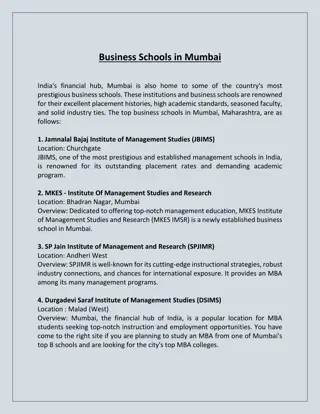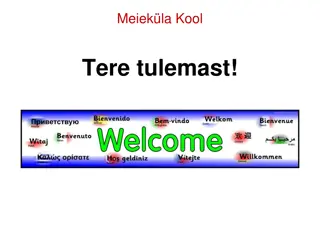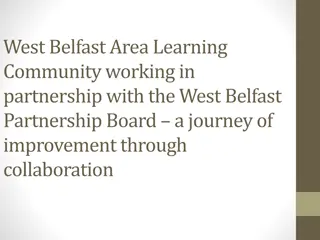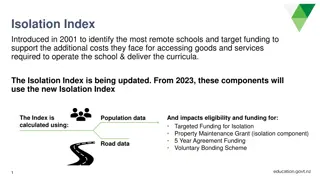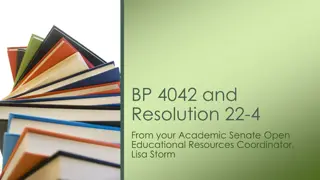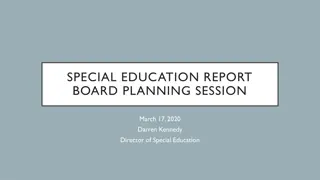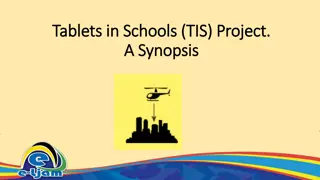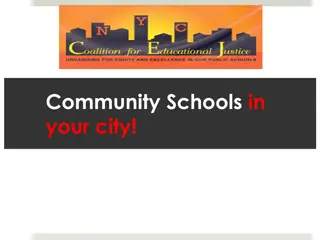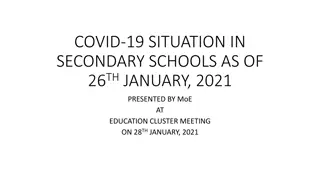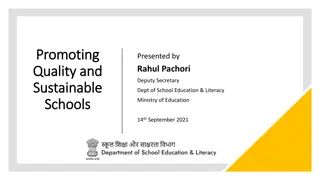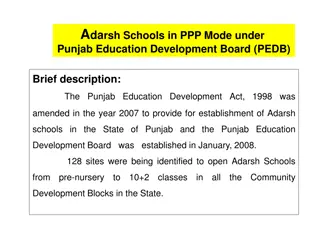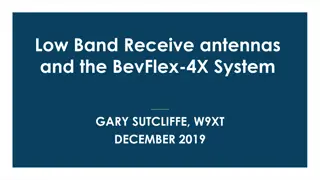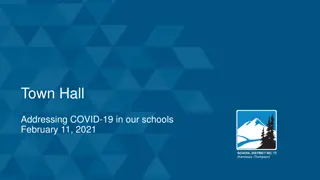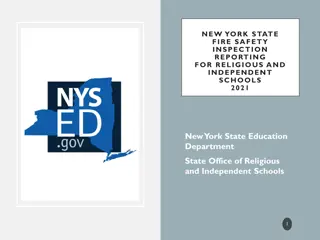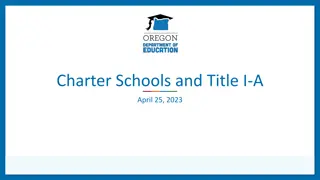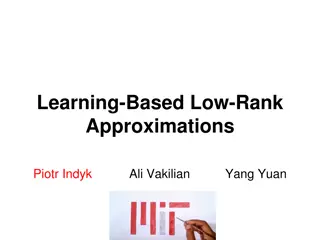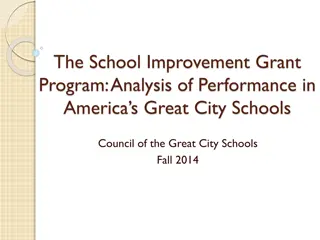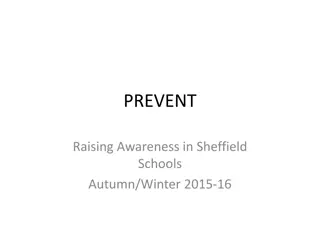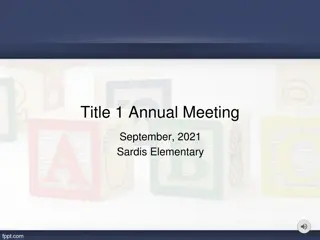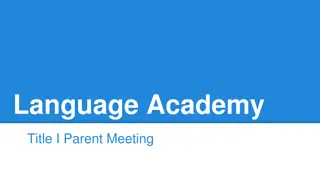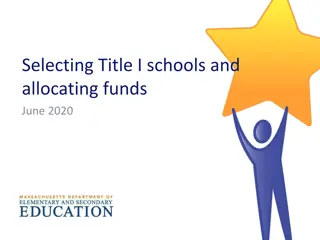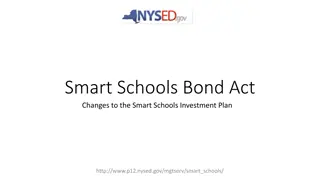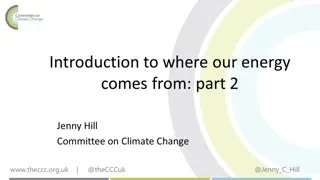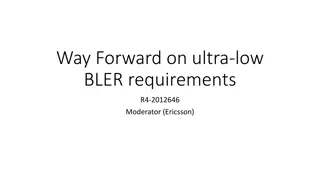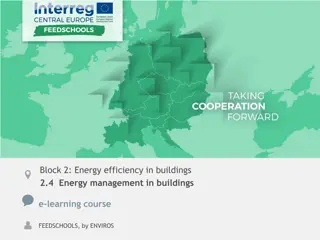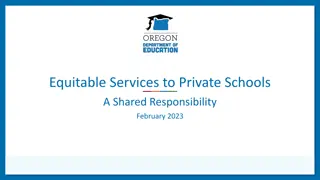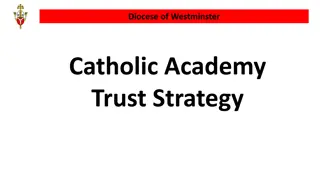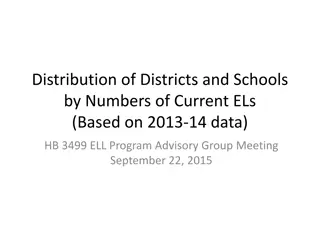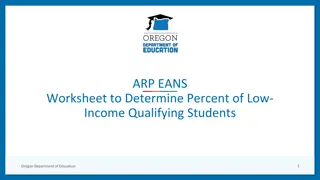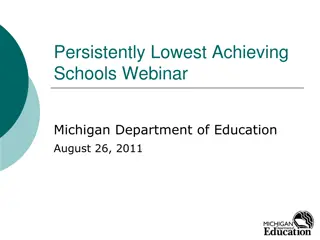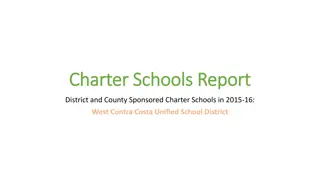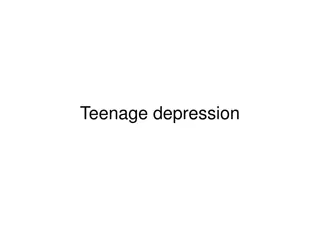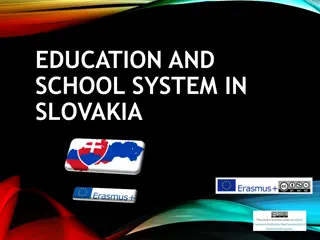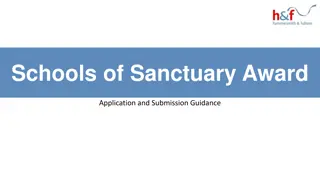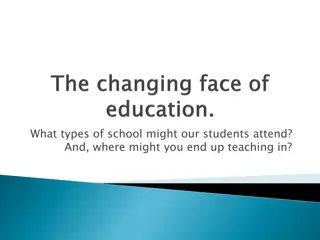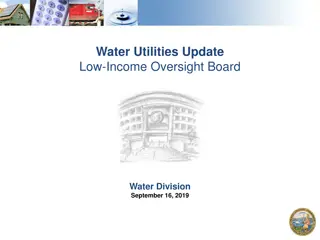Business Schools in Mumbai
India's financial hub, Mumbai is also home to some of the country's most prestigious business schools. These institutions and business schools are renowned for their excellent placement histories, high academic standards, seasoned faculty, and solid industry ties. The top business schools in Mumbai,
2 views • 3 slides
Overview of Education System in Estonia
Education in Estonia is compulsory for children aged 7 to 16, with a focus on secondary education. The system includes municipal schools, those requiring admission tests, private schools, special needs schools, and home schooling options. The three stages of basic school cater to different age group
3 views • 18 slides
A Decade of Collaboration and Transformation in West Belfast Schools
The West Belfast Area Learning Community and the West Belfast Partnership Board embarked on a journey of improvement through collaboration from 2007 to 2017. Initially facing challenges, schools transitioned from isolation to collaboration, driven by policy changes and the need for sustainable pract
1 views • 12 slides
Updates to Isolation Index and Targeted Funding for Remote Schools
The Isolation Index introduced in 2001 to identify remote schools is being updated to better allocate funding based on isolation levels. Changes include using updated population and road data, redefining isolation criteria, and revising funding formulas. The goal is to accurately support the most is
1 views • 6 slides
Academic Senate Resolutions and Low-Cost Thresholds in Higher Education
The Academic Senate addresses the adoption of open educational resources (OER) and low-cost materials to support academic freedom and compliance with legislative requirements. The resolution discusses the definition of low-cost resources and the variability among California Community Colleges in set
2 views • 9 slides
Special Education Department Report & Planning Session Highlights
Director Darren Kennedy led a planning session on March 17, 2020, focusing on Special Education Department goals for the 2019/2020 school year, student placements, tuition costs at various schools, approved private schools, licensed private schools, PPS schools, and an Extended School Year proposal
1 views • 12 slides
Tablets in Schools (TIS) Project Synopsis
The Tablets in Schools (TIS) Project, funded by the Ministry of Science, Energy & Technology, aims to enhance education through the integration of technology in Jamaican schools. With over 1,100 schools participating, this initiative provides tablets, laptops, audio-visuals, software, and infrastruc
0 views • 32 slides
Unlocking the Potential: Benefits of Community Schools
Community schools are neighborhood hubs that offer not only academic education but also various services to support the whole child and the entire community. By addressing obstacles like hunger, health issues, and family instability, community schools improve graduation rates, student performance, a
0 views • 12 slides
COVID-19 Situation in Secondary Schools and Boarding Facilities
COVID-19 situation in secondary schools as of January 26, 2021, presented by the Ministry of Education. All schools were closed on January 18, 2020, with boarding school learners retained for assessment and testing due to mass infection. Students are isolated following health guidelines. A summary o
1 views • 12 slides
Promoting Quality and Sustainable Schools: An Educational Perspective
Education plays a crucial role in promoting quality and sustainable schools. The focus is on shifting to student-centric learning outcomes, encompassing various aspects like curriculum design, pedagogy, and teacher competency. Sustainability in schools emphasizes the importance of resource managemen
1 views • 14 slides
Overview of Doctoral Schools at UPB and Statistics
University POLITEHNICA of Bucharest offers a comprehensive range of doctoral programs in various engineering and exact science domains. The doctoral schools are led by the Council of Doctoral University Studies and cover areas such as energy engineering, chemistry, physics, and mathematics. With ove
0 views • 5 slides
Adarsh Schools in Punjab under PPP Mode - Overview and Features
The Punjab Education Development Board (PEDB) established Adarsh schools in Punjab under a Public-Private Partnership (PPP) model to provide free education following the CBSE pattern to students. These schools operate on a cost-sharing basis with private partners, offering various benefits such as n
1 views • 7 slides
Private Schools: CARES Act Equitable Services Overview
This session introduces and discusses the implications of the CARES Act Equitable Services for private schools, including a timeline of events, court decisions, and implications for districts and private schools. The presentation covers the requirement for LEAs to provide equitable services to non-p
2 views • 12 slides
Understanding Low Band Receive Antennas and the Beverage Flex-4X System
Low band receive antennas, including the Beverage Flex-4X system, are crucial for long-distance propagation on bands such as 160, 80, 60, and 40 meters. Operating on low bands presents challenges like large wavelengths, high levels of QRM and QRN, and the need for effective noise reduction strategie
1 views • 24 slides
Town Hall Addressing COVID-19 in Schools - SD73 District Updates
The Town Hall event on February 11, 2021, addressed the impact of COVID-19 in schools within the SD73 District. Discussions included COVID-19 statistics, exposure rates in elementary and secondary schools, staff and student enrollment data, self-isolation directives, and comparisons before and after
3 views • 10 slides
New York State Fire Safety Inspection Reporting for Religious and Independent Schools 2021
This report outlines the fire safety inspection requirements for Religious and Independent Schools in New York State. Schools must ensure annual inspections of their buildings for compliance with regulations. The process includes submitting reports electronically through the NYSED Application Busine
0 views • 21 slides
Understanding Charter Schools and Title I-A Requirements in Oregon
Explore the landscape of charter schools in Oregon, their funding through Title I-A federal programs, inclusion in needs assessments, considerations for virtual charter schools, and requirements for rank and serve processes. Discover how charter schools play a vital role in meeting the unique needs
0 views • 13 slides
Boston Public Schools Autonomous Schools Overview
Boston Public Schools (BPS) offer various autonomous schools, including Innovation Schools, Pilot Schools, Turnaround Schools, and Horace Mann Charter Schools. The 2015-16 school year saw an increase in overall enrollment in autonomous schools, with 32% of BPS students attending them. Families are m
1 views • 16 slides
Learning-Based Low-Rank Approximations and Linear Sketches
Exploring learning-based low-rank approximations and linear sketches in matrices, including techniques like dimensionality reduction, regression, and streaming algorithms. Discusses the use of random matrices, sparse matrices, and the concept of low-rank approximation through singular value decompos
0 views • 13 slides
Analysis of School Improvement Grant Program Performance in Great City Schools
This analysis focuses on trends in school performance in the United States regarding the School Improvement Grant (SIG) program under the American Recovery and Reinvestment Act of 2009. It compares schools that received SIG awards with SIG-eligible and non-SIG-eligible schools, examining changes in
0 views • 26 slides
PREVENT Strategy Implementation in Sheffield Schools: Autumn/Winter 2015-16
Raising awareness of the PREVENT strategy in Sheffield schools during the Autumn/Winter term of 2015-16 is crucial for safeguarding and preventing individuals from supporting terrorism. The strategy emphasizes the duty of schools to address all forms of terrorism through various initiatives like wor
0 views • 16 slides
Understanding Title I Program in Schools
The Every Student Succeeds Act (ESSA) mandates Title I schools to conduct annual meetings to inform parents about the program, their school's participation, and parental rights. Title I provides federal funding to support low-achieving students and those at risk. This assistance includes additional
1 views • 12 slides
Understanding Title I Schools and Parent Involvement
The Elementary and Secondary Education Act of 1965 introduced Title I schools to provide additional federal funding to support students from low-income families, ensuring fair access to quality education. Title I schools have specific requirements, including maintaining highly qualified staff, invol
0 views • 8 slides
Guide to Selecting Title I Schools and Allocating Funds
Learn how to allocate Federal Title I funds to schools based on poverty percentages and student needs. This guide outlines the process for selecting Title I schools, determining funding allocations, and ensuring equitable distribution of resources. Understand the key steps involved in identifying sc
0 views • 14 slides
Changes to Smart Schools Investment Plan
The Smart Schools Bond Act has brought changes to the Smart Schools Investment Plan, including new requirements for nonpublic educational technology loans and updates to sections concerning school connectivity and classroom learning technology. Districts are now required to differentiate loanable an
0 views • 23 slides
Achieving UK Net-Zero: Strategies for Carbon Capture and Low-Carbon Fuels
Explore the pathways to achieving UK net-zero carbon emissions through carbon capture, low-carbon alternative fuels like hydrogen and bioenergy, and sustainable bioenergy practices. Learn about the importance of zero-carbon hydrogen production and the challenges and benefits of utilizing bioenergy f
0 views • 12 slides
Way Forward on Ultra-Low BLER Requirements in Wireless Communication
Explore the agreements and discussions around ultra-low BLER (Block Error Rate) requirements for URLLC (Ultra-Reliable Low Latency Communication) in wireless communication systems. Gain insights into the test methodologies, decision co-ordinates, applicability rules, and open issues related to CQI (
0 views • 9 slides
Mixed Bag of Academic Performance in Denver Innovation Schools - December 2023
Denver's innovation and innovation zone schools show varied academic outcomes, with innovation zone schools outperforming other governance types while innovation schools lag behind. Growth also varies widely by governance type. Subgroup analysis reveals innovation zone and innovation schools have be
0 views • 9 slides
Energy Management in Schools: Building Efficiency Training
This e-learning course module, part of a training package by Enviros, aims to educate local authorities, school managers, teachers, and students on energy management in schools. It covers concepts like greenhouse gas emissions, Life Cycle Assessment methodology, and Carbon Footprint indicators to pr
0 views • 30 slides
Equitable Services to Private Schools: Shared Responsibility and Requirements
Equitable services to private schools involve federal programs supported by tax dollars, allowing all children and teachers access to various educational programs. Private schools must be not-for-profit to qualify. Consultation plays a crucial role in reaching agreements on providing equitable and e
0 views • 17 slides
Diocese of Westminster Catholic Academy Trust Strategy Overview
The Diocese of Westminster Catholic Academy Trust (CAT) is focused on putting children first, embracing change, and fostering collaboration among schools. Their strategy includes defining hubs and Family CATs, addressing the challenges faced by schools and local authorities, and proposing a model to
0 views • 16 slides
Analysis of EL Numbers in Oregon Schools and Districts
This analysis, presented during the HB 3499 ELL Program Advisory Group Meeting, highlights the distribution of Oregon districts and schools based on the number of current English Learners (ELs). It emphasizes the importance of considering EL numbers in identifying low-performing institutions and dis
0 views • 4 slides
Worksheet for Determining Percent of Low-Income Qualifying Students by Oregon Department of Education
Oregon Department of Education offers a worksheet to determine the percentage of low-income qualifying students at schools. Eligibility criteria include enrolling a significant portion of low-income students, with at least 23% of families having a household income not exceeding 185% of the 2020 Fede
0 views • 5 slides
Understanding Michigan's Persistently Lowest Achieving Schools Webinar
Explore the criteria and processes involved in identifying and supporting persistently lowest achieving schools in Michigan. Discover the state statutes, requirements, and timelines for these schools, including the development of redesign plans and potential modifications to collective bargaining ag
0 views • 48 slides
Charter Schools Report: District and County Schools in West Contra Costa Unified School District
The report provides information on charter schools in the West Contra Costa Unified School District for the academic year 2015-16. It includes data on enrollment numbers, demographics, special education provision, and poverty rates among students. The report highlights the diverse student population
0 views • 9 slides
Addressing Teenage Depression in Schools: Strategies and Support Systems
Teenage depression is a prevalent issue in schools today. Schools can prevent and address depression through the support of specialists like psychologists, nurses, and counselors. When psychological problems are recognized, schools strategize by engaging in open conversations with students, parents,
0 views • 20 slides
Overview of Education System in Slovakia
The education system in Slovakia comprises state schools, church-owned schools, and private schools. It includes different school types such as kindergartens, primary schools, secondary schools, and universities. Primary education is free and compulsory, starting at age 6 and divided into two stages
0 views • 11 slides
Schools of Sanctuary Award: Application and Submission Guidance
The Schools of Sanctuary Award, given by the City of Sanctuary movement, recognizes schools that actively practice sanctuary principles. These principles include learning about seeking sanctuary, embedding welcoming practices, and sharing achievements with the community. Becoming a School of Sanctua
0 views • 9 slides
Types of Schools and School Leaving Age Guidelines
Students attend various types of schools, including community schools, academies, grammar schools, foundation schools, and studio schools in England. Compulsory participation age for education or training was raised to 18 by the Education and Skills Act in 2008. Students can leave school at 16 but m
0 views • 24 slides
Water Utilities Update on Low-Income Oversight Board - September 16, 2019
This update provides information on low-income programs related to water utilities, including total enrollments, discounts, lead testing in schools, and proposed statewide water low-income programs. It also discusses measures to increase the effectiveness of low-income programs through community-bas
0 views • 9 slides
